In the seven Kalyana Karnataka districts of Karnataka, an Information and Communications Technology (ICT) skilling program of remarkable scale and impact is unfolding, touching the lives of 2 lakh+ students in grades 8, 9 and 10 every year across 1,028 Government high schools.
What’s Behind this Radical Change?
This compelling shift is the result of a collaboration between Dell Technologies, the Education Department of State of Karnataka, and the NGO India Literacy Project (ILP) that aims to strengthen the future workforce with necessary digital literacy whilst enhancing their subject learning.
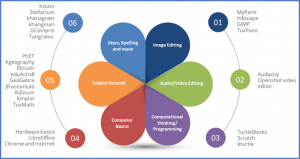
The Challenges of Incorporating ICT in Schools
The Karnataka Government has made significant progress in ICT skilling for high school students through its Technology Assisted Learning Program (TALP). The main goal of the program is to apply computer tools practically to enhance subject learning. Thousands of high schools in Karnataka now have Linux-based computer labs and follow NCERT’s “ICT in School Education” program. Teachers have received a mix of basic and advanced training on Linux and tools for subject-based learning.
While TALP is implemented only in select schools across all districts of Karnataka, in the Kalyana Karnataka region, almost all Government high schools have computer labs thanks to the support from the Kalyana Karnataka Development Board (KKDB).
However, there were challenges as listed below leading to suboptimal utilization of the lab infrastructure:
- Teachers struggled to find time to train students on tools before incorporating them into subject-based learning.
- Many teachers, being new to computers, found it challenging to become proficient with Linux and related tools.
- TALP aimed to involve all subject teachers, not just designated computer teachers, which was not consistently happening.
- Limited internet access and difficulties with offline tool installation resulted in missing software on most computers for learning.
Together Towards a Common Goal
Here’s where ILP stepped in, creating a comprehensive solution to tackle these challenges. ILP introduced a customized Ubuntu version pre-installed so that it doesn’t rely on internet access, saving time for teachers and creating a more interactive, independent environment for the students.
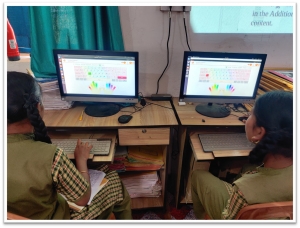
Forging a Path to Digital Independence
The game-changer was the introduction of a series of self-learning video modules in Kannada (the state’s primary language) for each ICT tool, effectively ensuring that English wouldn’t act as a barrier to learning. These self-learning videos were copied by the ILP team in all computers across the 1000+ schools for easy access without internet. The result? A classroom filled with empowered learners, independently exploring ICT tools, creating projects, and applying these skills to their everyday learning.
Boosting Confidence of Students and Teachers
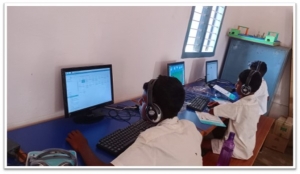
The self-learning videos had the dual advantage of being both offline and flexible, allowing students to move at their own pace and build a confident repertoire of digital skills. Since the students could self-learn the tools, teachers could now focus on incorporating digital tools into their teaching without having to teach the basics first, making for more efficient use of classroom time.
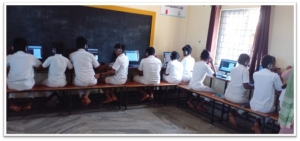
Holistic Growth With Eye-On-Future
Complementing the computer skilling program, ILP also introduced a comprehensive Career Guidance program. This program equipped the students with the knowledge of various career options where they can exercise their newly acquired Computer skills, empowering them to make informed plans for their future.
Sustainable Impact
The approach taken in this initiative is scalable and sustainable. Along with the computer labs that are made available and maintained by the Government, the schools now also have the required self-learning resources and processes to continue skilling students independently, underlining the true essence of a sustainable model.
Marching Ahead
This program is an example of how innovation, collaborations, and vision can transform learning, empower future workforce, and create a meaningful impact in the education sector. It signals towards a brighter, empowered, and technologically skilled generation.
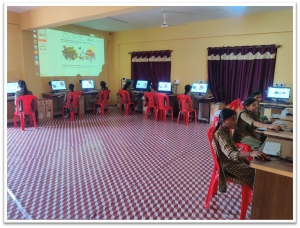
While there is still a lot more to do, with the support from Dell Technologies, activated computer labs in schools and confident teachers, the Government of Karnataka’s vision of ICT in school education and skilling the future workforce is confidently marching ahead in the right direction.
